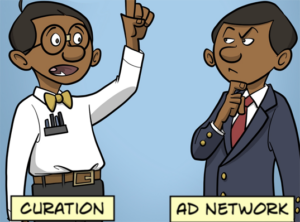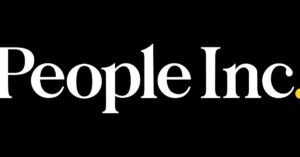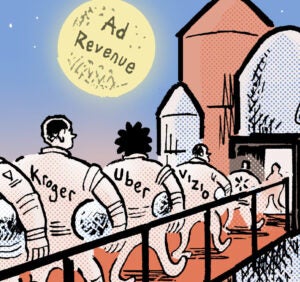 Update 4:00 ET: In a recently-released blog post, Mozilla VP of content services Darren Herman announced the kick-off of an experimental program called Directory Tiles. Normally, when Firefox users open a new tab, they see tiles featuring images from sites they’d visited in the past. New users with no Firefox surfing history will, upon opening the web browser for the first time, see tiles depicting sponsored sites (Herman indicated these sponsored sites will be clearly labeled).
Update 4:00 ET: In a recently-released blog post, Mozilla VP of content services Darren Herman announced the kick-off of an experimental program called Directory Tiles. Normally, when Firefox users open a new tab, they see tiles featuring images from sites they’d visited in the past. New users with no Firefox surfing history will, upon opening the web browser for the first time, see tiles depicting sponsored sites (Herman indicated these sponsored sites will be clearly labeled).
“While we have not worked out the entire product roadmap,” Herman wrote, “we are beginning to talk to content partners about the opportunity, and plan to start showing Directory Tiles to new Firefox users as soon as we have the user experience right.”
~~~
Firefox developer Mozilla is seeking to collaborate with advertising and publishing partners on several initiatives, a move that suggests the company often thought of as being averse to advertising has become more receptive to collaborating with marketers.
Mozilla’s prospective initiatives are focused on personalization features, transparency and its open-sourced mobile operating system, said Darren Herman, VP of content services at Mozilla.
Personalization represents an enormous opportunity for Mozilla to enhance its browser offerings, Herman said.
“The browser is going to play an evolved role in how the user consumes content online,” Herman told AdExchanger. “And if Mozilla’s going to be competitive as a technological product moving forward, we need to offer something that offers our users as much personalization as they want.”
Last year, Mozilla began working on a project code-named UP (user personalization), in which a team of developers worked with publishers to test ways to personalize the content on their sites using signals from Mozilla’s browser.
Mozilla uses the signals to build a history of a user’s browser activities to serve personalized recommendations. Unlike a third-party cookie, however the publisher cannot transmit these signals to other sites and it is up to the user to share his or her history with the publisher.
“We want to show users that if they want to do so, they can tailor their Web experience and have complete control over it,” said Herman. Herman declined to name the publishers who are working with Mozilla, but said that the company has approached additional partners at the ALM.
Mozilla also is experimenting with a feature that would allow partners to provide users with sponsored content. The company is testing the feature with a subset of users for about 12 weeks before deciding whether to move forward with the project, Herman said.
Herman also outlined the company’s mobile agenda, which includes promoting its open-sourced Firefox OS phones. Designed with HTML5, the phones have been targeted at consumers outside the US who own feature phones and are in the market for an affordable smartphone.
Mozilla hopes to expand its mobile footprint further by promoting its open-sourced mobile operating system to other markets, Herman said.
“We believe there’s an opportunity for an open ecosystem just like Firefox [on the desktop],” he said. “We believe that there should be open ecosystems and competition is good. [We’re] launching the future of our business.”
Herman also discussed Mozilla’s stance on supporting advertising IDs. While Mozilla has no plans to create its own advertising ID (it believes cookies “are not right” for online users since average users cannot tell if they are being tracked), the company will consider supporting other advertising IDs if they adhere to Mozilla’s requirements on transparency and user controls.
“If any of the proposals in the marketplace meet our needs to be transparent and trustworthy for our user base, we will consider backing them,” Herman explained. He declined to identify specific partners, saying Mozilla is “talking to everybody and not ruling anyone out yet.”
Following its announcement last year that the company was postponing its plans to disable third-party cookies on its browser, this decision seems to suggest the company is warming up to further collaborations with advertisers.
The IAB and Mozilla have differed on consumer privacy and online advertising. When Mozilla announced last year that it was planning to block third-party cookies on its browser and was working with Stanford’s Center for Internet and Society to create a “cookie clearinghouse,” IAB president and CEO Randall Rothenberg denounced the company’s actions as “arrogant.”
Herman declined to comment on whether Mozilla was still supporting the cookie clearinghouse.
Following the IAB’s criticisms of Mozilla’s actions, the company’s decision to hire MDC Partners’ Darren Herman in November to lead its new content services division signaled a turning point in the browser company’s communications with advertisers, Rothenberg said.
“While we weren’t happy with the things they [Mozilla] said they were going to do back then, they’re an important company and we have a large group of people who have concerns about the things Mozilla is thinking of doing,” he said. “And on top of that, hiring Darren Herman who understands the digital advertising industry very well is an important move by Mozilla, so it just seemed sensible to have him here.”














